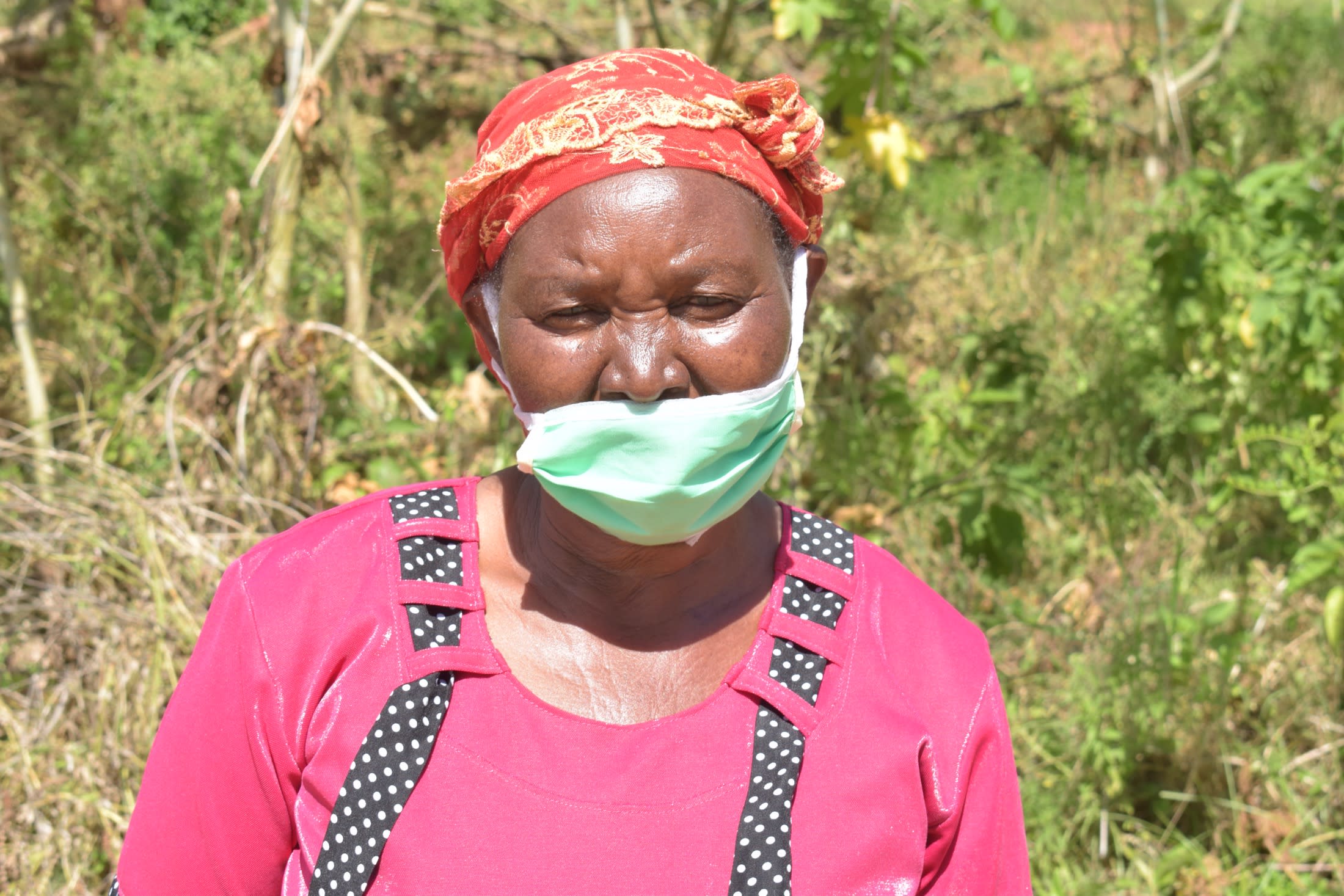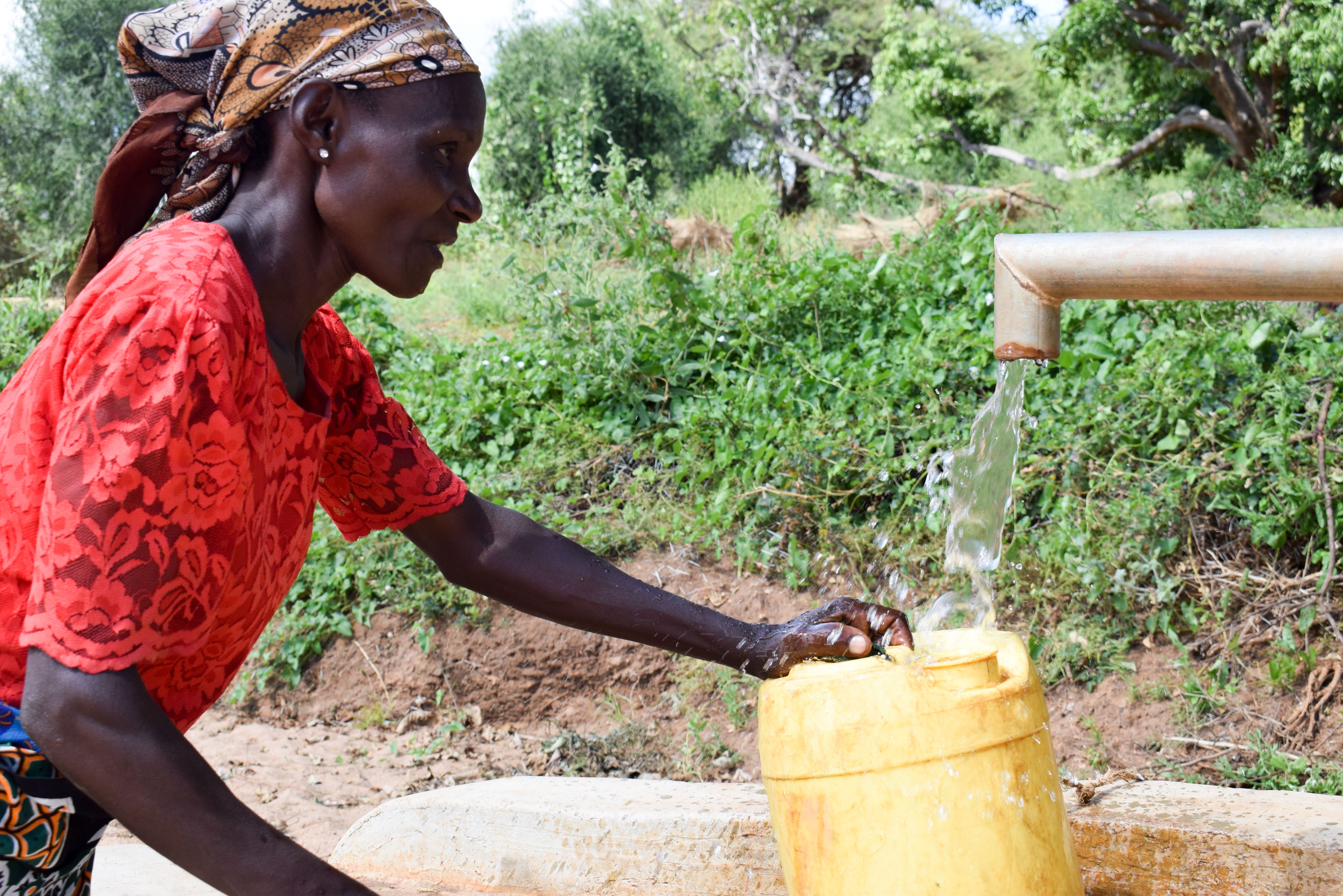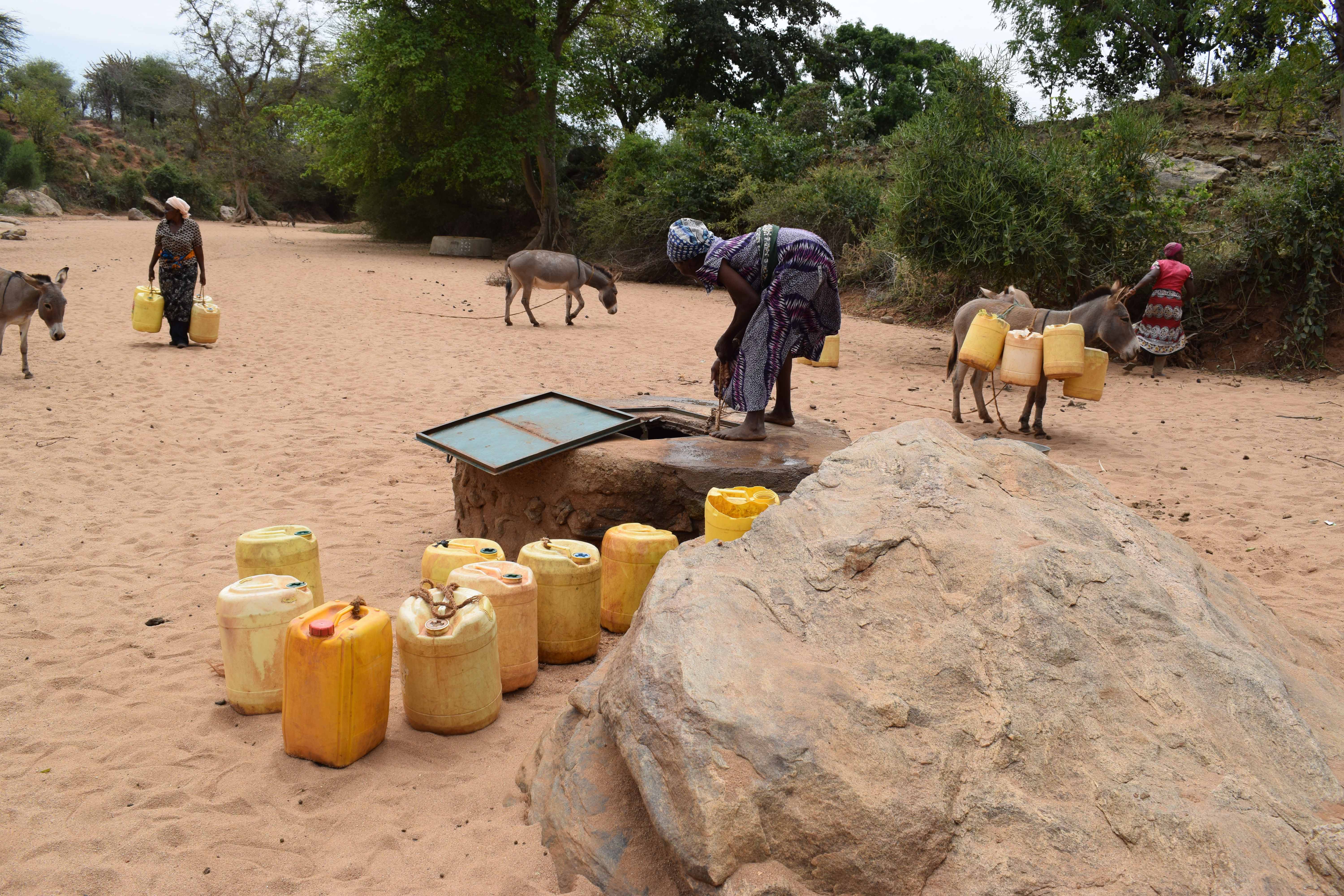Project Updates
August, 2020: Through Their Eyes: COVID-19 Chronicles with Mary Kitheka
This post is part of a new series by The Water Project meant to highlight the perspectives and experiences of the people we serve and how the COVID-19 pandemic is impacting them. We invite you to read more of their stories here.
Our team recently visited Katalwa Community to conduct a COVID-19 prevention training and monitor their water point. We checked in on the community and asked how the pandemic is affecting their lives.
It was during this most recent visit that Mary Kitheka shared her story of how the Coronavirus has impacted her life.

Our team met Mary outside her home to conduct the interview. Both our staff and Mary observed physical distancing and other precautions throughout the visit to ensure their health and safety. The following is Mary’s story in her own words.
How has COVID-19 impacted your family?
All my working children were sacked and others their companies closed, sending them home with no pay, this has brought a lot of financial challenges at home. In the past rain season, I only had a handful harvest which has been depleted because of the increased consumption at home, the situation is terrible because market days are now suspended, and I cannot even sell livestock and get money for upkeep.
What steps is Kenya taking to prevent the spread of the virus?
The government has imposed movement curfews across the country with no movement of people being allowed past 7 PM up to 5 AM. Counties with high cases of the virus are locked down. No travel is allowed in and out of the counties to control its spread to other areas. Our local members of the county assembly supported us with masks in our village so that we can be able to protect ourselves while in public places.

Since the outbreak of COVID-19 in Kenya, has fetching water changed for you because of restrictions, new rules, or your concerns about the virus?
As a community, we had implemented two sand dams and shallow wells over the years in our village. Water is now accessible to all from within. I only walk to the well with my children and grandchildren, draw water, and walk back home. Having water from within is helping us avoid interactions with people from outlying areas while also making the stay at home guidelines easy to follow.

Mary washes her hands
How has having a clean water point helped you through the pandemic so far?
The shallow wells are fully functional and have been providing us with clean water all the time. We put to use our knowledge of handwashing and soap making. We make soap for use in our tippy taps to enable regular handwashing with soap as a way to protect ourselves from the Coronavirus.
How has getting food been at this time?
I depend on my small farm produce as the primary source of food for my family. The food is little compared to the population at home and with no adequate extra funding. Getting supplies from the local markets has been a challenge as the markets are closed, while others have taken advantage of raising the prices of essential food commodities.

May, 2020: COVID-19 Prevention Training Update at Katalwa Community
Our teams are working on the frontlines of the COVID-19 pandemic. Join us in our fight against the virus while maintaining access to clean, reliable water.

We are carrying out awareness and prevention trainings on the virus in every community we serve. Very often, our teams are the first (and only) to bring news and information of the virus to rural communities like Katalwa, Kenya.
We trained community members on the symptoms, transmission routes, and prevention of COVID-19.
Due to public gathering concerns, we worked with trusted community leaders to gather a select group of community members who would then relay the information learned to the rest of their family and friends.

We covered essential hygiene lessons:
- Demonstrations on how to build a simple handwashing station
- Proper handwashing technique
- The importance of using soap and clean water for handwashing
- Cleaning and disinfecting commonly touched surfaces including at the water point.

We covered COVID-19-specific guidance in line with national and international standards:
- Information on the symptoms and transmission routes of COVID-19
- What social distancing is and how to practice it
- How to cough into an elbow
- Alternative ways to greet people without handshakes, fist bumps, etc.
- How to make and properly wear a facemask.
During training, we installed a new handwashing station with soap near the community’s water point.

Due to the rampant spread of misinformation about COVID-19, we also dedicated time to a question and answer session to help debunk rumors about the disease and provide extra information where needed.
Water access, sanitation, and hygiene are at the crux of disease prevention. You can directly support our work on the frontlines of COVID-19 prevention in all of the communities we serve while maintaining their access to safe, clean, and reliable water.

May, 2019: A Year Later: Nzalae Community Well
A year ago, your generous donation helped us construct a hand-dug well for Nzalae Community in Kenya. The contributions of incredible monthly donors and others giving directly to The Water Promise allow our teams to visit project sites throughout the year, strengthening relationships with communities and evaluating the water project over time. These consistent visits allow us to learn vital lessons and hear amazing stories. Read more...

January, 2018: Nzalae Community Hand-Dug Well Complete
Nzalae Community, Kenya now has a new source of water thanks to your donation. A new hand-dug well has been constructed adjacent to a sand dam on a local river. The dam will build up sand to raise the water table and naturally filter water. Community members have also attended hygiene and sanitation training, and plan to share what they learned with their families and neighbors. You made it happen, now help keep the water flowing! Join our team of monthly donors and help us maintain this hand-dug well and many other projects.
The report below from our partner gives the latest details of the project. We also just updated the project page with new pictures, so make sure to check them out!
Project Result: New Knowledge
The training officers communicated with self-help group committee members to plan four days of hygiene and sanitation training. Total attendance was wonderful, with both the area chief and his assistant chief there. It was held at Janet Musili's homestead, which was a central meeting point for participants.

The first day was set aside for sharing expectations, discussing issues common to Nzalae, and taking a transect walk. This walk around the community and its homesteads revealed both the strengths and the weaknesses that we would need to focus on the next few days.

On the transect walk
The next day, we met to talk about how much waste the community generates, and how much that waste can then contaminate the environment and cause illnesses. We also calculated the medical costs to show that yes, properly disposing of waste is worth it! It may require capital investment when building a latrine, but community members will save money in the long run.

The third day we focused on the transmission of germs. How are germs spread, and how can we build barriers for those routes?
Last but certainly not least, we gathered together to make an action plan for implementing all of these new things. We also taught how to build hand-washing stations and how to make soap.

Mixing soap
69-year-old Jedidah Mue expressed her gratefulness by saying, "It was a good training. There are two activities that we did during the training: the transect walk and the water contamination activity that have challenged us to construct latrines. I’m sure that open defecation will no longer be practiced in our area. Calculation of medical bills has made us realize that we spend a lot of money for treatment that we are supposed to be utilizing on developing ourselves. During elections, I spent over 8,000 shillings on treatment. This was as a result of drinking dirty water. From the knowledge I have gained, I’m sure that our water has been contaminated with feces. I have already started warning my family not to practice open defecation and lied to the young ones that some police officers have been deployed to monitor those defecating in the open."
Project Result: Hand-Dug Well
We delivered the experts and materials, but the community helped get an extraordinary amount of work done. They collected local materials to supplement the project, including sand and water.

Local women helped by making meals for the workers.
A hole seven feet in diameter is excavated up to a recommended depth of 25 feet. (Most hand-dug wells don’t reach that depth due to the existence of hard rocks between 10-18 ft.).

The beginning of the well excavation process
The diameter then shrinks to five feet when construction of the hand-dug well lining is completed. This lining is made of brick and mortar with perforations to allow for water to seep through. As sand builds up around the well walls, it will naturally filter the rainwater that’s stored behind the dam.

Once the lining reaches the top, the well is covered with a concrete well pad.
Once the construction of the lining reaches ground level, a precast concrete slab is laid on top and joined to the wall using mortar. Four bolts for the hand-pump are fixed on the slab during casting. The mechanics arrive to install the pump as community members watch, learning how to manage and maintain the pump for themselves. The well is then given a few days after installing the pump, allowing the joints to completely dry. After it rains, communities are advised to pump out the first water that seeps into the well because it often has a foul smell and a bad taste. After pumping that for a while, the water becomes clean and clear for safe drinking.
This hand-dug well was built simultaneously with its adjacent sand dam (to see the sand dam, click here). The sand dam will collect sand that stores and filters huge amounts of water, water that will then be accessed through the pump.

November, 2017: Nzalae Community Hand-Dug Well Underway
Nzalae Community in Kenya will have a clean source of water, thanks to your generous donation. A new well is being constructed adjacent to a new sand dam, which will bring clean water closer to hundreds. Together, these resources will go a long way in stopping disease, hunger, and thirst in the area! We just posted a report including community details, maps, and pictures. We will keep you posted as the work continues!


 Protected Dug Well
Protected Dug Well
 Rehabilitation Project
Rehabilitation Project


































